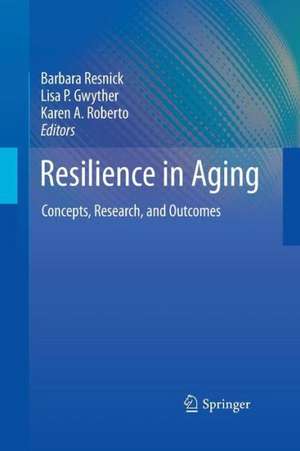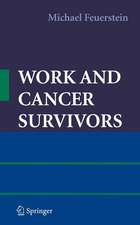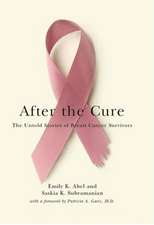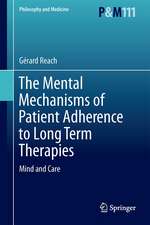Health Services for Cancer Survivors: Practice, Policy and Research
Editat de Michael Feuerstein, Patricia A. Ganzen Limba Engleză Paperback – sep 2014
| Toate formatele și edițiile | Preț | Express |
|---|---|---|
| Paperback (1) | 1101.00 lei 6-8 săpt. | |
| Springer – sep 2014 | 1101.00 lei 6-8 săpt. | |
| Hardback (1) | 1108.51 lei 6-8 săpt. | |
| Springer – 5 mai 2011 | 1108.51 lei 6-8 săpt. |
Preț: 1101.00 lei
Preț vechi: 1158.95 lei
-5% Nou
Puncte Express: 1652
Preț estimativ în valută:
210.70€ • 219.16$ • 173.95£
210.70€ • 219.16$ • 173.95£
Carte tipărită la comandă
Livrare economică 12-26 aprilie
Preluare comenzi: 021 569.72.76
Specificații
ISBN-13: 9781489993472
ISBN-10: 1489993479
Pagini: 420
Ilustrații: XXIII, 395 p.
Dimensiuni: 155 x 235 x 22 mm
Greutate: 0.59 kg
Ediția:2011
Editura: Springer
Colecția Springer
Locul publicării:New York, NY, United States
ISBN-10: 1489993479
Pagini: 420
Ilustrații: XXIII, 395 p.
Dimensiuni: 155 x 235 x 22 mm
Greutate: 0.59 kg
Ediția:2011
Editura: Springer
Colecția Springer
Locul publicării:New York, NY, United States
Public țintă
ResearchDescriere
Health has been conceptualized by world and national health organizations (WHO, CDC, Healthy People 2010) as more than the absence of disease. It involves a focus on physical, psychosocial, and functional aspects of life as well as the prevention of future illnesses. At this point in the development of quality health care for cancer survivors, there is sufficient knowledge and expert opinion to push efforts forward to improve the health of cancer survivors. Clearly there is more research in the most prevalent forms of cancers (e.g., breast cancer) than others that provide us with guidance on how to optimize their health, but there are data on other forms of cancers that can also better inform practice. There may also be general care practices that can cut across cancer types. There has been an emergence of epidemiological and clinical research in cancer survivors that can form the basis for a revolution in the quality and nature of health care that survivors receive. This book not only provides the reader with diverse perspectives and data but also integrates this information so it can serve as the foundation necessary to improve and maintain the health of cancer survivors.
Reporting of symptoms to health care providers is a complex, multi-determined problem influenced not only by the pathophysiology but also, as we have learned over the years through pain research, by societal, cultural, and biobehavioral factors. This book will consider this important aspect of follow-up for millions of cancer survivors because of the strong reliance on symptom reporting for clinical decision making. In order for us to generate meaningful and effective treatment, we need to better understand the symptom experience in cancer survivors. This book provides much information that will assist us to better understand and manage this complicated end point. The presenting problems need to be articulated and “conceptualized” as clearly as possible by both parties so appropriate actions can be taken. Since health care costs are a major concern for patients, payers, and providers, this area will also be addressed in all the relevant sections.
In taking an interdisciplinary perspective, this book illustrates the importance of a team approach to the improvement of health care and associated health, well-being, and functioning in cancer survivors. The 17 chapters cover critical topics of which physicians and providers of all types must be aware in order to provide the most comprehensive and responsive care for cancer survivors. All of the clinical care chapters include case studies to illustrate the real-world application of these approaches in cancer survivors. Information about sources of referral both within and outside the traditional health care communities will be provided in tabular form. There is no other text that provides both an overview of the problems and their challenges, case illustrations of direct application, and the reality of reimbursement for such care. The editors hope that there may be no need for the clinician or the survivor to adapt to a “new normal” if the presenting problems are understood and handled from an interdisciplinary perspective as outlined here.
Reporting of symptoms to health care providers is a complex, multi-determined problem influenced not only by the pathophysiology but also, as we have learned over the years through pain research, by societal, cultural, and biobehavioral factors. This book will consider this important aspect of follow-up for millions of cancer survivors because of the strong reliance on symptom reporting for clinical decision making. In order for us to generate meaningful and effective treatment, we need to better understand the symptom experience in cancer survivors. This book provides much information that will assist us to better understand and manage this complicated end point. The presenting problems need to be articulated and “conceptualized” as clearly as possible by both parties so appropriate actions can be taken. Since health care costs are a major concern for patients, payers, and providers, this area will also be addressed in all the relevant sections.
In taking an interdisciplinary perspective, this book illustrates the importance of a team approach to the improvement of health care and associated health, well-being, and functioning in cancer survivors. The 17 chapters cover critical topics of which physicians and providers of all types must be aware in order to provide the most comprehensive and responsive care for cancer survivors. All of the clinical care chapters include case studies to illustrate the real-world application of these approaches in cancer survivors. Information about sources of referral both within and outside the traditional health care communities will be provided in tabular form. There is no other text that provides both an overview of the problems and their challenges, case illustrations of direct application, and the reality of reimbursement for such care. The editors hope that there may be no need for the clinician or the survivor to adapt to a “new normal” if the presenting problems are understood and handled from an interdisciplinary perspective as outlined here.
Cuprins
Part 1. Current Concerns.- Specific challenges in optimizing the health care of survivors.- Providers’ and cancer survivors’ concerns about health care.- Epidemiology of recurrent and new cancers.- Symptoms over time: What is their role in surveillance?- Access to care among cancer survivors.- Symptoms among cancer survivors: Biobehavioral mechanisms and current health care response.- Part 2. Clinical Management.- General health.- Targeting provider-survivor communication.- Oncologic health.- Health behaviors: General strategies (diet, weight loss, exercise, stress).- Behavioral health.- Functional outcomes.- Self-management.- The cancer survivorship clinic.- The cancer survivorship plan.- Part 3. Current Needs and Future Directions.- What works, and what should be stepped up?- Future challenges and potential solutions.
Notă biografică
Michael Feuerstein, Ph.D., MPH is Professor of Public Health in the Departments of Medical and Clinical Psychology and Preventive Medicine and Biometrics, Uniformed Services University of the Health Sciences, F. Edward Hebert School of Medicine, Bethesda, Maryland. He is also Director of the Clinical Psychology Doctoral Program at that institution. In addition, he is Clinical Professor in the Department of Psychiatry, Division of Behavioral Medicine, at Georgetown University School of Medicine, Washington, DC. Dr. Feuerstein is editor-in-chief of Journal of Occupational Rehabilitation and Journal of Cancer Survivorship, as well as editor of Handbook of Cancer Survivorship (2007) and Cancer Survivors and Work (2009). He is a Fellow of the Academy of Behavioral Medicine Research, the American Psychological Association, and the Society of Behavioral Medicine, and a Member of the Human Factors and Ergonomics Society, the Association for Advancement of Behavioral Therapy, the International Association for the Study of Pain, and the New York Academy of Sciences. Patricia Ganz, M.D. is Professor of Health Services in the School of Public Health, Professor of Medicine in the David Geffen School of Medicine at UCLA, and Vice Chair of the Department of Health Services. She teaches health care practices and variations and ethical issues in public health. She is also the Director of the Division of Cancer Prevention and Control Research of the Jonsson Comprehensive Cancer Center at UCLA and leads a large research group that applies the scientific disciplines of public health (epidemiology, health services, behavioral sciences, biostatistics) to research on the prevention, detection, treatment, and supportive care of cancer. In addition, she is associate editor of Journal of Clinical Oncology and Journal of the National Cancer Institute, and is a member of the editorial board of the Cochrane Breast Cancer Group. In 1999 she was named an American Cancer Society Clinical Research Professor and in 2007 she became a member of the Institute of Medicine. Dr. Ganz has devoted the past 25 years to the study of quality-of-life outcomes in cancer and other chronic diseases.
Textul de pe ultima copertă
Health Services for Cancer Survivors Practice, Policy, and Research Michael Feuerstein and Patricia A. Ganz, editors
Between early detection and current medical advances, more cancer patients are living longer post-treatment. But all too often, survivors’ lives are complicated by medical, psychosocial, and economic challenges that their providers downplay as the “new normal.” Health Services for Cancer Survivors replaces this scenario with an integrative, evidence-based framework for improving the health of survivors over the long term, across clinical settings and specific diagnoses. Emphasizing an interdisciplinary team approach, contributors review the current state of survivor care and model a proactive future. Human factors, particularly in the areas of symptoms and symptom reporting, health costs, and individualized care, are highlighted as keys to survivors’ health, well-being, and functioning. The book offers diverse perspectives, informative data, and real-world case studies as it:
Between early detection and current medical advances, more cancer patients are living longer post-treatment. But all too often, survivors’ lives are complicated by medical, psychosocial, and economic challenges that their providers downplay as the “new normal.” Health Services for Cancer Survivors replaces this scenario with an integrative, evidence-based framework for improving the health of survivors over the long term, across clinical settings and specific diagnoses. Emphasizing an interdisciplinary team approach, contributors review the current state of survivor care and model a proactive future. Human factors, particularly in the areas of symptoms and symptom reporting, health costs, and individualized care, are highlighted as keys to survivors’ health, well-being, and functioning. The book offers diverse perspectives, informative data, and real-world case studies as it:
- Defines quality health care in the context of cancer survivor experience.
- Introduces the Cancer Survivorship Care Plan, a first-steps strategy for integrating survivor care.
- Pinpoints specific areas for improvement, including symptom management, health behaviors, rehabilitation, psychological well-being, and disparities in health care access and delivery.
- Outlines practical strategies for optimizing primary, oncological, palliative community-based, and end-of-life care.
- Provides detailed information on epidemiology, health economics, and other areas critical to clinical decision-making.
- Analyzes the new health care reform measures as an opportunity to reform survivor care.
Caracteristici
Focuses exclusively on the quality of health care and services
Focuses on integrating evidence-based healthcare into care decision making process
Provides specific information on what needs to change to improve quality of healthcare services for survivors
Includes supplementary material: sn.pub/extras
Focuses on integrating evidence-based healthcare into care decision making process
Provides specific information on what needs to change to improve quality of healthcare services for survivors
Includes supplementary material: sn.pub/extras






















